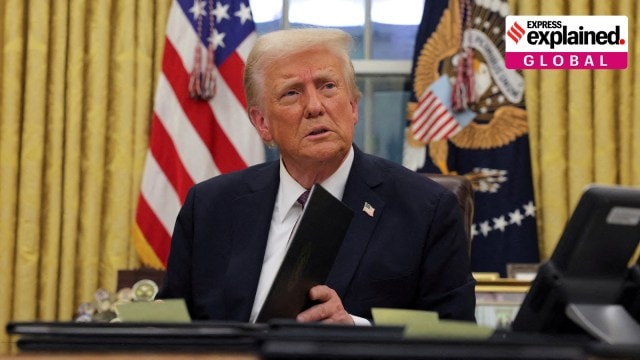The move does not come as a surprise considering Trump had threatened to withdraw in his last term too, and officially notified the UN General Secretary of the decision in 2020. Nonetheless, health experts are concerned about the cut in funding and expertise that the WHO may experience in the coming years.

The WHO is a UN body working on global health. It works with countries to strengthen their primary health care, its guidelines help prepare government policies, and it helps organise programmes to tackle specific diseases.
What does the executive order say?
Trump’s executive order highlights four key things that will happen as the US exits from the global health organisation:
One, any transfer of US funds and resources to the WHO will be paused.
Two, all US government personnel or contractors working in any capacity with the WHO will be recalled.
Three, the United States will “identify credible and transparent United States and international partners to assume necessary activities previously undertaken by the WHO.”
Story continues below this ad
Four, and importantly, the United States will cease negotiations towards the pandemic treaty the WHO is working on. The accord aims to better prepare countries to respond to pandemics, create a framework for global cooperation if a pandemic happens, and develop mechanisms for equitably sharing medical countermeasures such as drugs and vaccines. “… actions taken to effectuate such agreement and amendments will have no binding force on the United States,” the executive order says.
What will be the financial implication?
Withdrawal of the United States is likely to have a huge financial impact on the WHO, with the agency receiving around a fifth of its funds from the country. This is one of the points of contention for President Trump, with the executive order stating: “China, with a population of 1.4 billion, has 300 percent of the population of the United States, yet contributes nearly 90 percent less to the WHO.”
WHO’s funding essentially comes in two ways — the mandatory assessed contributions from all its member countries, and the voluntary contributions raised from various countries and organisations. Over the years, the assessed contributions have remained stagnant and now cover less than 20% of the organisation’s budget.
In assessed contributions, the United States is the biggest payer, accounting for 22.5% of the contributions, followed by China at 15%. Of the total USD 578 million assessed contributions, the United States pays approximately USD 138 million and China USD 87.6 million.
Story continues below this ad
In voluntary contributions, while the US is still the biggest donor, accounting for around 13% (USD 356.3 million) of the total contributions in 2023, China accounted for only about 0.14% of the total contributions (USD 3.9 million). The second biggest voluntary contributor was the Bill and Melinda Gates Foundation.
“I don’t think it is a surprise, there were signals from the incoming government. Forewarned means forearmed. This is a clarion call for leaders from the rest of the world to step up, we have been calling on everyone to contribute more. Take for example, Indonesia, which has contributed significantly in preparation,” said Dr Ayoade Alakija, Board Chair of the non-profit FIND and African Union’s African Vaccine Delivery Alliance. He added: “It is unfortunate because the WHO is to keep the whole world safe.”
The uncertainty owing to the US elections did result in WHO receiving more voluntary contributions last year. In the 2024 funding round that ended in November, Australia, Indonesia, and Spain pledged USD 1.7 billion. This led to WHO getting 53% of the USD 7.1 billion it needs for programme implementation between 2025-28. This is up from 17% it had secured for its previous four-year period in 2020.
How did the WHO react to Trump’s move?
In a statement, it said: “The World Health Organization regrets the announcement…WHO plays a crucial role in protecting the health and security of the world’s people, including Americans.”
Story continues below this ad
On the matter of transparency, the WHO statement added: “With the participation of the United States and other Member States, WHO has over the past 7 years implemented the largest set of reforms in its history, to transform our accountability, cost-effectiveness, and impact in countries.”
Will India be impacted?
With WHO losing out on a significant proportion of its funding, its work across countries, including India, is likely to be affected.
The WHO participates in and supports several health programmes of the Indian government, such as its work on neglected tropical diseases, HIV-malaria-and tuberculosis, anti-microbial resistance, among others. Importantly, it plays a significant role in the country’s immunisation programme, with WHO teams even monitoring vaccine coverage.
“WHO participates in health programmes of countries across the world, to the extent their governments allow. A funding cut like this would mean they will not be able to effectively implement these programmes,” said a public health expert from India who has previously worked with the WHO.
Story continues below this ad
In addition, the loss of expertise from the United States would also impact WHO’s role of providing guidance. “Whether it is a pandemic due to a novel virus or chronic diseases, WHO provides framework guidelines that are utilised and adapted by countries for their local programmes. These guidelines are usually developed by collecting all published evidence, grading them, and then discussing the evidence in expert committees. These committees are constituted keeping in mind where a disease is endemic, where there is ongoing research in the area, where countermeasures are produced. It is representative of different regions and genders. US experts are likely to be a part of several such committees and their work will get affected if they are pulled out,” the expert quoted above said.
Importantly, this will also sever the collaboration between the WHO and the US Centres for Disease Control and Prevention (CDC), which is key to international surveillance and response to health threats.
How can member states withdraw from the WHO?
There is no provision for withdrawing in WHO’s constitution. The US Congress, however, at the time of joining the organisation in 1948, had laid down a condition that said the country could withdraw after giving a one-year notice and meeting the financial obligations of the current year.
What is the role of India and the global south?
Story continues below this ad
The vacuum created by the United States is likely to be filled by China and countries from the global south, including India, said experts. A policy piece by ORF said that Europe could be another contender, but a considerable amount of its resources are diverted towards the Russia-Ukraine conflict, “indicating that the lacuna will be filled by philanthropies like the BMGF (Bill and Melinda Gates Foundation).”
Dr Alakija said: “PM Modi has been setting a good example by investing in holistic health for the people. India has also positioned itself right at the top as the voice of the global south. In the new global order, we need voices from India, South Africa, and others to step up and pull the others up along with them.”








































